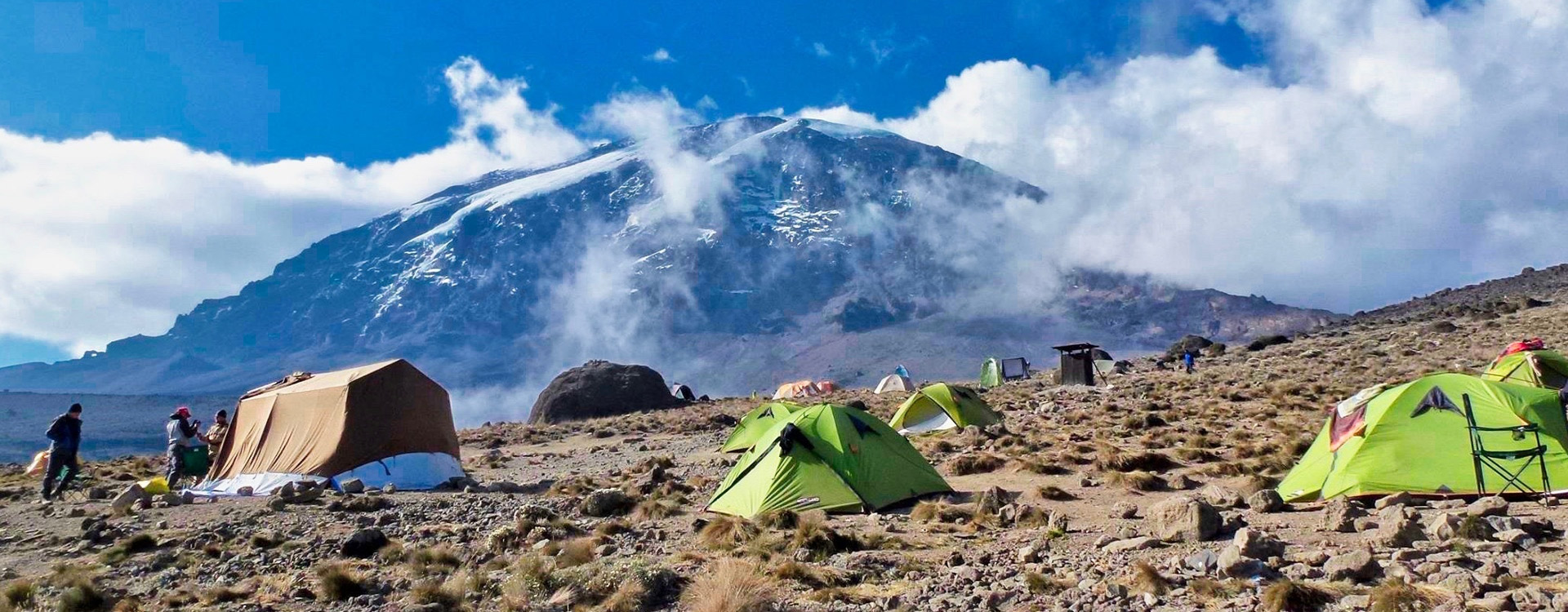
Tour Overview
The Umbwe route has a well-deserved reputation of being the most challenging route on Mount Kilimanjaro. Due to the fast ascent to high altitude, this route does not provide the necessary stages for acclimatization. Although the number of people on this trail is very low, the chances of success are also low. Umbwe is considered to be very difficult, taxing route – one that should only be attempted by strong hikers who are confident in their ability to acclimatize quickly to altitude.
Approaching from the south, the Umbwe route is a short, steep and direct climb. After reaching Barranco Camp, the trail turns east and traverses underneath Kilimanjaro’s Southern Ice Field on a path known as the Southern Circuit before summiting from Barafu. Descent is made via the Mweka route.
Day by Day Itinerary
Day 1: Umbwe Gate (1,400m/4,600ft) to Umbwe Cave Camp (3,000m/9,800ft)
Elevation Gain: 1,600 metres / 5,200 feet
Your head guide will meet you for the drive from Moshi to the Umbwe Gate where you will need to register for your climb. After entry formalities are complete begin climbing the winding trail through the forest, looking out for Colobus monkeys as you go! The ascent is steady through this magnificent dense rain forest. Trekking time is approximately 5-6 hours.
Day 2: Umbwe Cave Camp (3,000m/9,800ft) to Barranco Camp (3,850m/12,650ft)
Elevation Gain: 850 metres / 2,850 feet
Soon after leaving camp the forest begins to thin as you climb the narrow ridge with deep valleys either side. The terrain becomes rockier and the surrounding trees are draped with ‘goat’s beard’ moss. You may even have occasional glimpses of Kibo, the imposing summit cone of Kilimanjaro. Closer to camp the trail begins to flatten out finally descending into Barranco Camp where you will spend the night. Trekking time is approximately 4-5 hours.
Day 3: Barranco Camp (3,850m/12,600ft) to Barafu Camp (4,600m/15,100ft)
Elevation Gain: 750 metres / 2,500 feet
After breakfast, we leave Barranco Camp and begin our climb up the Barranco Wall. This is an impressive scramble where you will be rewarded with fantastic views back towards camp. The porters climbing the wall are also an impressive sight. From the top, at 4,200m, you will follow an undulating path around the mountain side. On a clear day there are spectacular views of Kibo to your left and Mount Meru to your right. After descending into the Karranga Valley your climb takes you through Karranga Camp and steadily on to Barafu. This is located on the ridge below the summit cone. You have now completed the South Circuit, which offers views of the summit from many different angles. At Barafu we make camp, rest, enjoy dinner, and prepare for the summit day. The two peaks of Mawenzi and Kibo can be seen from this position.
Day 4: Barafu Camp (4,600m/15,100ft) to Uhuru Peak (5,895m/19,300ft) then descending to Mweka Camp (3,110m/10,200ft)
Elevation Gain: 1,295 metres / 4,200 feet
Elevation Loss: 2,785 metres / 9,100 feet
In the early hours of the morning you will begin your final ascent to the summit of Uhuru Peak. This part of the climb takes approximately 6-8 hours. It can be very cold at night at these elevations, but it will be quite warm by the end of the hiking day and therefore you will want clothing for both extremes. Just when you think you’ve had enough of climbing in the dark the sun will rise and you will be rewarded with a rich red sky framing Mawenzi. At Stella Point (5,750m) you join the crater rim. From here, climb gently to Uhuru Peak which is the highest point on Mount Kilimanjaro and the continent of Africa. From the summit the descent will take you straight down to Mweka Hut, with lunch served on the way. This part of the descent takes about 6 hours. Later in the evening enjoy your last dinner on the mountain and a well-earned sleep.
Day 5: Mweka Camp (3,110m/10,200ft) to Mweka Gate (1,830m/6,000ft)
Elevation Loss: 1,280 metres / 4,220 feet
Descend straight to the gate through lush forest (2-3 hours), looking for monkeys along the way. Return to Moshi from Mweka Village.
Prices Include:
Park fees, camping fees, rescue fees, head guide, assistant guides, cook, & porters salaries, all food, drinking water, tents, transport to/from park entry gate.

